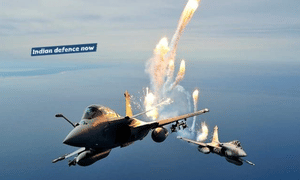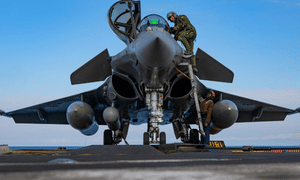

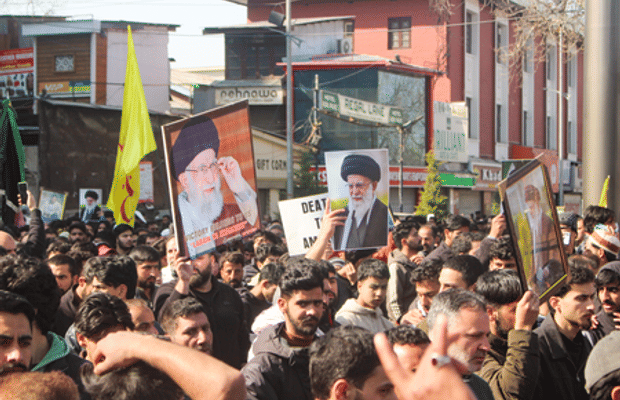
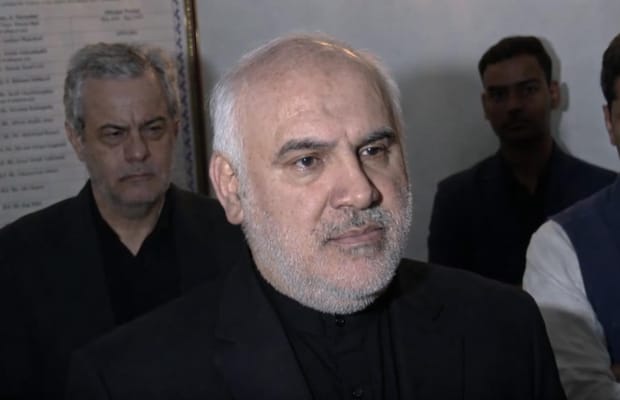


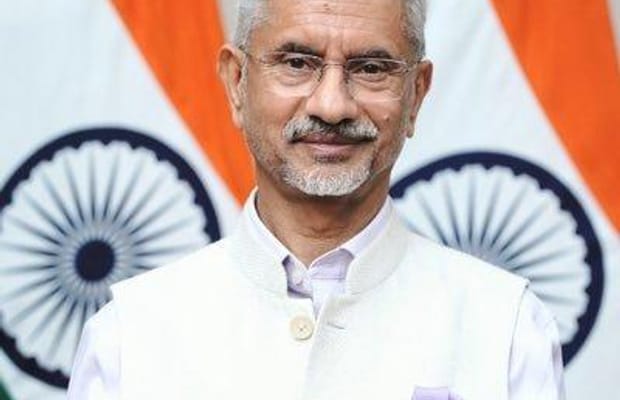

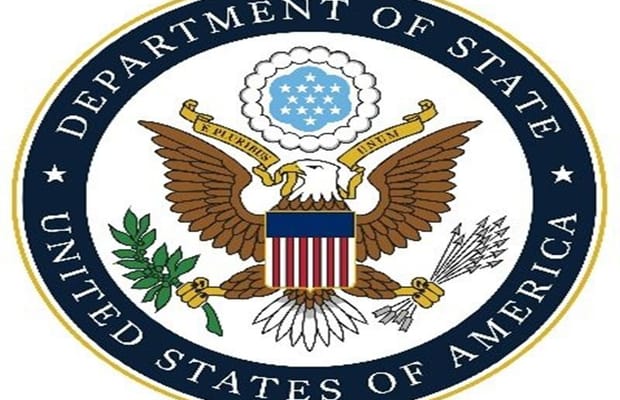
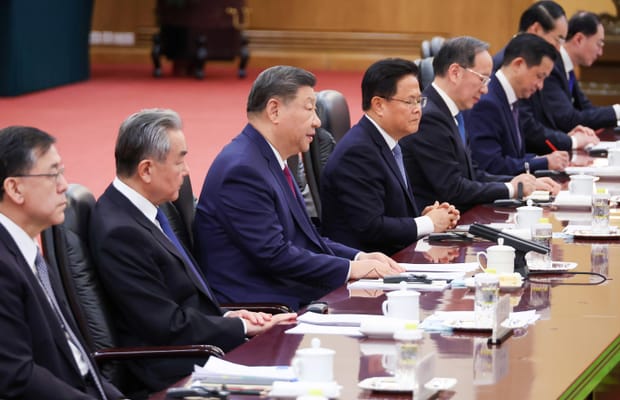
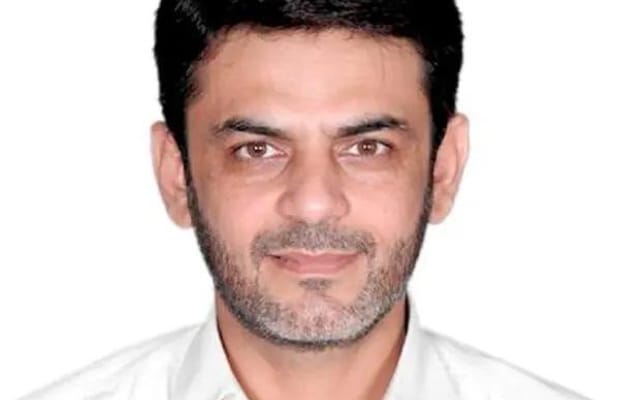
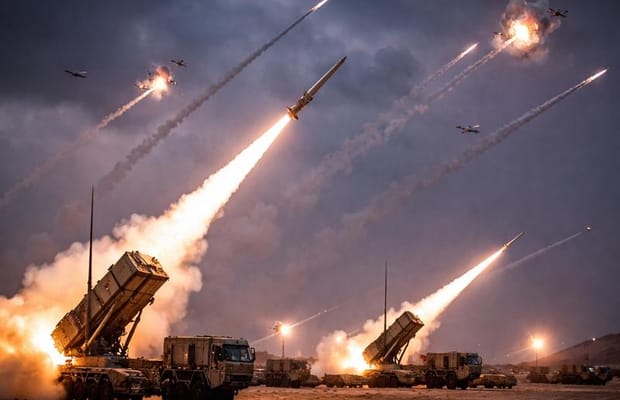
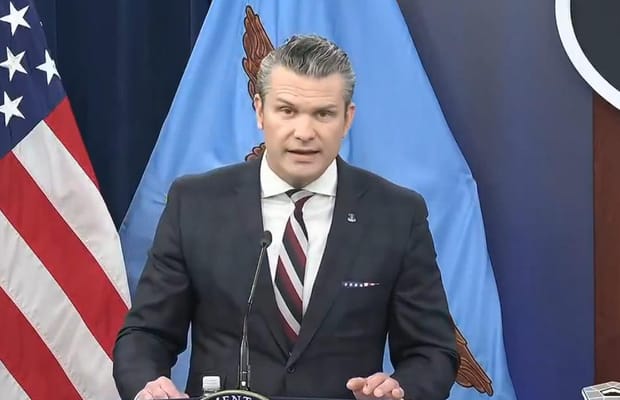
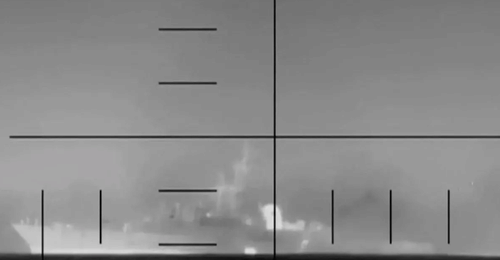
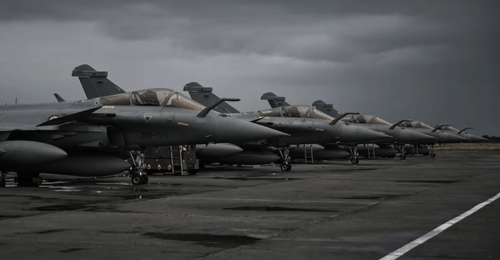




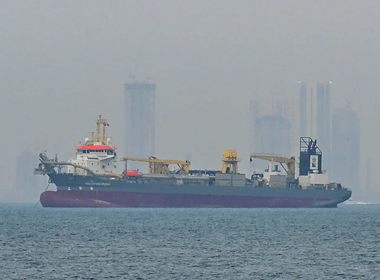




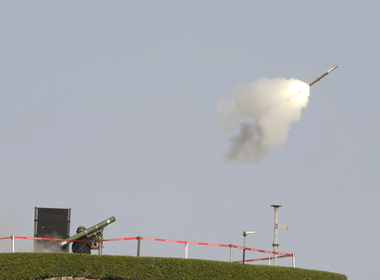
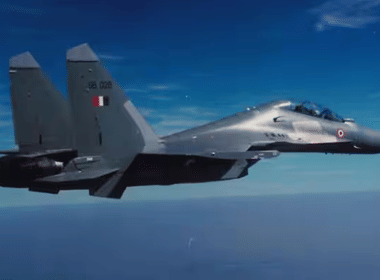

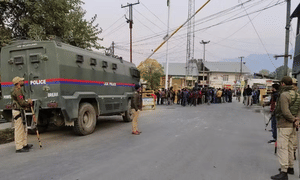
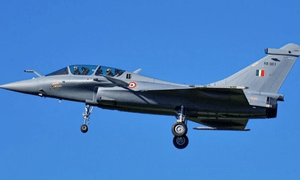


India has strongly rejected as “baseless” a viral claim that the United States is using its naval ports to launch strikes against Iran amid rising tensions in the Middle East. The claim originated from a video interview of retired US Army Colonel Douglas Macgregor on One America News Network (OAN). In the clip, Macgregor alleged that, with US bases and harbor facilities destroyed, American naval forces are now relying on Indian ports. He said, “All of our bases have been destroyed. Our harbour installations are destroyed. We are actually having to fall back on India and Indian ports, which is less than ideal; that is what the navy says.”
India’s Ministry of External Affairs (MEA) quickly dismissed the report via its official FactCheck account on X (formerly Twitter), calling the claims “fake and false” and warning against “baseless and fabricated comments.” The response reflects New Delhi’s focus on countering misinformation on sensitive national security and international issues.
The controversy comes amid a sharp escalation in the US-Israel-Iran conflict, triggered last Saturday by joint American-Israeli strikes on Iran, which killed the country’s 86-year-old Supreme Leader, Ayatollah Ali Khamenei. Iran retaliated with missile attacks on Israel and US bases in the Gulf. On Tuesday night, a US submarine reportedly sank an Iranian warship in the Indian Ocean near Sri Lanka—the first such submarine strike on a surface vessel since World War II—resulting in 87 deaths. Casualties continue to rise, with over 1,000 reported in Iran, around a dozen in Israel, and at least six US troops killed.
US President Donald Trump defended the pre-emptive strikes, describing America’s performance as “15 out of 10,” and claiming Iran posed an imminent threat. Israeli Prime Minister Benjamin Netanyahu framed the conflict as a necessary response, insisting it would not be “an endless war.” The region remains tense, with Iran’s missile attacks—including cluster bombs—raising concerns about technological support from Russia and China, while oil markets face potential disruptions.
For India, the MEA’s swift denial underscores its effort to protect strategic autonomy, maintain stable relations with the US and Israel, and avoid being drawn into a volatile conflict near its maritime interests in the Indian Ocean. Analysts note that Macgregor’s unverified claims demonstrate how retired military voices can amplify misinformation online, often faster than official clarifications. Observers will continue monitoring India’s stance as the conflict unfolds, especially given its growing defense cooperation with the US through the Quad and bilateral agreements.
Disclaimer: This image is taken from Indian Defence News.
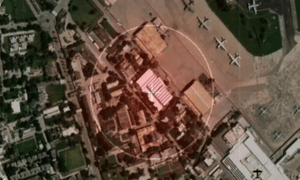
Amid rising cross-border tensions, the Islamic Emirate’s Ministry of National Defence announced that the Afghan Air Force carried out targeted strikes on several key Pakistani military installations. Among the locations hit were the Nur Khan Airbase in Rawalpindi, the 12th Brigade base in Quetta, Balochistan, and the Khoizai camp in Mohmand Agency, Khyber Pakhtunkhwa, along with other critical military sites.
The Afghan Ministry described the operation as highly effective, claiming substantial damage to all designated targets. The strikes were presented as retaliation for recent Pakistani air raids on Afghan territory, including attacks on Kabul, Bagram Airbase, and other locations over the past two days. The Nur Khan Airbase, situated in Rawalpindi’s Chaklala area, is strategically important as a hub for Pakistan Air Force operations and due to its proximity to Islamabad. It had previously been struck during India’s Operation Sindoor in May of the previous year, following a terror attack in Pahalgam, Jammu and Kashmir. Satellite imagery from that period confirmed extensive damage to Nur Khan and other bases, including PAF Base Mushaf, Bholari, and PAF Base Shahbaz.
Afghanistan’s Ministry stated that preliminary assessments show considerable destruction at the targeted sites and issued a warning that any future violations of Afghan airspace would provoke stronger retaliation, emphasizing Kabul’s commitment to defending its sovereignty. The escalation marks a serious intensification of hostilities along the 2,640-kilometre Durand Line, a historically disputed and porous border. Tensions have persisted since the Taliban regained power in 2021, fueled by accusations of cross-border militancy, refugee flows, and territorial encroachments. Pakistan has long accused Afghan territory of harboring Tehrik-i-Taliban Pakistan (TTP) militants, prompting Islamabad to conduct airstrikes and ground operations, which Kabul has condemned as breaches of sovereignty. Afghanistan’s recent strikes are unusual, representing a rare counter-offensive with its limited air capabilities.
The timing coincides with ongoing instability in Balochistan and Khyber Pakhtunkhwa, regions affected by separatist insurgencies and militant activity. Striking the 12th Brigade base in Quetta may reflect an attempt to exploit Pakistan’s internal vulnerabilities, while the Mohmand Agency camp has historically sheltered militants.
The escalation has regional implications. India, having previously targeted Nur Khan, may interpret Afghanistan’s strikes as indirectly advancing its interests against Pakistan. China, invested in the China-Pakistan Economic Corridor in Balochistan, could push for de-escalation, while the United States and NATO are likely monitoring for counter-terrorism impacts.
Despite limited resources, Afghanistan’s air force demonstrated unexpected reach in striking Pakistani targets. Details remain unclear on the methods used—whether fighter jets, drones, or loitering munitions—and Pakistan’s defensive measures, including Chinese-supplied J-10 jets and HQ-9 missile systems. Pakistan has not yet issued an official response, but reports indicate emergency military meetings in Rawalpindi. Social media from border areas shows heightened alerts, troop mobilization, and civilian precautions near the affected sites.
This tit-for-tat escalation risks further destabilizing South Asia, disrupting trade, worsening humanitarian situations in refugee camps, and potentially drawing in regional powers. Diplomatic efforts, including the Quadrilateral Coordination Group involving Afghanistan, Pakistan, China, and the US, appear stalled amid the crisis. With Afghanistan’s international isolation under Taliban rule and Pakistan’s internal challenges, a swift resolution seems unlikely, signaling the possibility of continued border clashes.
Disclaimer: This image is taken from Deccan Chronicle.
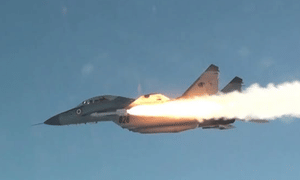
The Indian Air Force (IAF) has released a landmark video showcasing the Sudarshan S-400 long-range air defense missile system in operational action for the first time. Dropped ahead of the prestigious Vayu Shakti-2026 exercise, the footage offers a rare public glimpse into one of India’s most advanced and closely guarded military assets. Shared on the social media platform X, the video demonstrates the S-400—referred to as the Sudarshan Chakra in Indian service—tracking and neutralizing simulated aerial threats during rigorous drills. The demonstration highlights the system’s seamless integration into India’s layered air defense network.
Accompanying the release, the IAF celebrated a historic achievement: the longest-range kill ever recorded in military history. This milestone occurred during Operation Sindoor in May 2025, amid rising cross-border tensions, when the system intercepted drones and missiles targeting Indian cities and military bases. Operation Sindoor was a critical moment for India’s air defenses, as IAF units deployed the S-400 to prevent large-scale incursions along vulnerable borders. Its precise operations averted significant damage, cementing its role as a key asset in protecting Indian airspace.
In a recent X post, the IAF described its forces as “infallible, impervious, and precise,” following a full-dress rehearsal at Pokhran ahead of Vayu Shakti-26. All simulated targets were successfully neutralized, confirming full operational readiness for the main event on 27 February in Pokhran, Jaisalmer. The S-400 Triumf, procured from Russia under a multi-billion-dollar deal, is among the world’s most capable surface-to-air missile systems. It features detection, tracking, and engagement ranges of up to 400 kilometers against aircraft, drones, and cruise missiles.
This capability significantly extends India’s defensive perimeter, enabling early warning and long-range interception that outperforms many regional adversaries. During Operation Sindoor, it proved pivotal in countering sophisticated aerial threats, earning recognition as a game-changing asset. India plans to further expand its capabilities by acquiring five additional S-400 squadrons from Russia. These negotiations, aimed at strengthening air defense in light of rising regional tensions, are set to be discussed at high-level India-Russia talks. The new units will enhance coverage in critical border sectors, reinforcing India’s commitment to technological superiority in a volatile security environment.
Compared with indigenous systems like Akash and QRSAM, the S-400 offers unmatched range and multi-target engagement. While domestic systems excel in mobility and cost-effectiveness, the Russian platform’s advanced radars and missile versatility provide a complementary high-end layer. Key S-400 features include the 91N6E Big Bird radar with up to 600 km surveillance, multi-missile compatibility (from the 40N6 long-range missile to short-range Pantsir integration), and AI-assisted target discrimination. The system can simultaneously track 300 targets and engage 36, adapting to stealth and hypersonic threats. Its mobility allows rapid deployment via transporter-erector-launchers, with units spaced up to 100 km apart for networked defense. AI integration in Indian service refines threat prioritization and reduces false positives in complex airspace.
Vayu Shakti-2026 will showcase the IAF’s capabilities with over 100 aircraft, including fighters such as Tejas, Rafale, Jaguar, Mirage-2000, Sukhoi-30MKI, MiG-29, and Hawk conducting precision strikes and air superiority missions. Transport aircraft including C-130J, C-295, and C-17 will demonstrate rapid airlift and logistics, essential for disaster relief, while helicopters such as Chetak, ALH MK-IV, Mi-17 IV, LCH Prachand, Apache, and Chinook will display assault, reconnaissance, and heavy-lift operations.
Remotely Piloted Aircraft will participate in simulated combat scenarios, highlighting networked warfare, alongside overseas evacuation and rescue missions, reflecting the IAF’s growing global reach. This unveiling comes as India balances foreign acquisitions with indigenous defense development. The S-400’s operational success reinforces strategic partnerships—particularly with Russia—while spurring domestic research in missile technology.
Amid persistent drone threats from Pakistan and China, the Sudarshan S-400 forms a cornerstone of India’s aerial defense. Its record-setting performance during Operation Sindoor sends a clear signal of India’s resolve and readiness. Vayu Shakti-2026 not only celebrates these capabilities but also previews future technologies, including AI-driven autonomy and hypersonic defense, reaffirming the IAF’s evolution into a technologically advanced and formidable force.
Disclaimer: This image is taken from Indian Defence News.
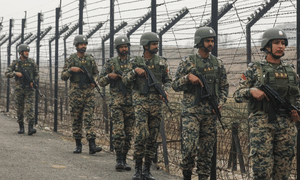
The Indian government has unveiled 'Prahaar', its inaugural national counter-terrorism policy and strategy, aimed at delivering a decisive blow against evolving terror networks. Announced by the Ministry of Home Affairs (MHA) earlier this week, the policy marks a shift toward proactive, tech-savvy defenses in an era of drone attacks, cyber radicalization, and cross-border financing.
At its core, Prahaar – which stands for Prevention, Response, Aggregation, Human Rights, Attenuation, Alignment, and Recovery – outlines a multi-layered approach to neutralize threats before they strike. It emphasizes real-time intelligence sharing through upgraded Multi-Agency Centres (MAC), empowering state police as frontline responders while elite forces like the NSG provide rapid backup. Officials highlighted how this addresses modern challenges, such as encrypted communications and cryptocurrency funding used by groups exploiting vulnerabilities from Jammu & Kashmir to urban hideouts.
The strategy also criminalizes all terror activities without exception, choking off safe havens and online propaganda pipelines. By integrating AI surveillance and border tech upgrades, Prahaar draws from real-world lessons, like the swift online mobilization seen in past attacks, to prevent repeats.
Prevention takes center stage with community outreach: partnerships with NGOs, schools, and local leaders to tackle root causes like radicalization in prisons and youth hotspots. Economic initiatives in high-risk areas aim to reduce recruitment appeal, fostering a "whole-of-society" resilience similar to successful models abroad. Globally, it pushes for collaborative operations and UN-level action on tech misuse by terror outfits. Union Home Minister Amit Shah described Prahaar as a "zero-tolerance hammer" on terrorism, promising proportionate responses to any aggression. As states gear up for implementation, security experts see it as a timely upgrade to India's defenses amid rising global threats.
Disclaimer: This image is taken from PTI.



Amid rising tensions in the U.S.–Israel–Iran conflict, airlines are diverting flights away from major Middle East routes that connect Asia and Europe. This shift raises the question: could new aviation hubs emerge beyond established centers like Dubai and Doha? How might this affect ticket costs, cargo transport, and the broader landscape of global air travel? Andrea Heng and Hairianto Diman explore these issues with Shantanu Gangakhedkar, Principal Consultant and Commercial Aviation Lead at Frost & Sullivan.
Disclaimer: This podcast is taken from CNA.

Whether it is issuing military threats toward Colombia and Cuba, suggesting the takeover of Greenland from Denmark, or capturing oil tankers in European and Caribbean seas, Donald Trump’s actions are forcing global leaders into constant crisis management. His renewed brand of American imperialism is reshaping international politics at a rapid pace. Jonathan Freedland discusses this shifting global landscape with Pulitzer Prize–winning author Anne Applebaum, examining what lies ahead in a world being rapidly transformed by the decisions of the US president.
Disclaimer: This podcast is taken from The Guardian.

The United States’ confiscation of a sanctioned Venezuelan oil tanker represents a significant escalation, denounced by Caracas as “international piracy.” Andrea Heng and Hairianto Diman examine the underlying strategic signal the Trump administration is sending to Latin America in the context of China’s expanding influence, alongside Ross Feingold, Head of Research at Caerus Consulting. They assess whether this aggressive move qualifies as a justified national security action, whether it accomplished its intended objectives, and how neighbouring countries have responded in the immediate aftermath.
Disclaimer: This podcast is taken from CNA.

On September 3, China held its largest military parade to date in Beijing’s Tiananmen Square to commemorate the 80th anniversary of the end of World War II. The event featured tens of thousands of soldiers, along with hundreds of aircraft, ground vehicles, and advanced weaponry. More than just a show of military might, the parade was intended as a symbol of deterrence, national solidarity, and a display of Xi Jinping’s authority in a period of global uncertainty. Andrea Heng discussed the significance of the event with Dr. Mustafa Izzuddin, Senior International Affairs Analyst at Solaris.
Disclaimer: This Podcast is taken from CNA.







